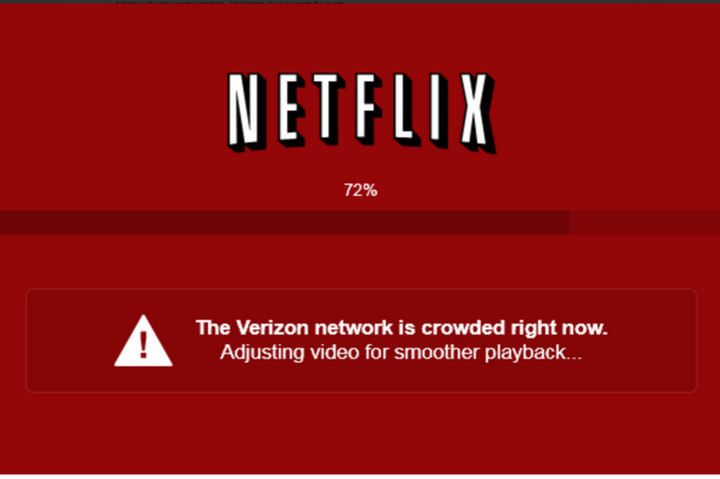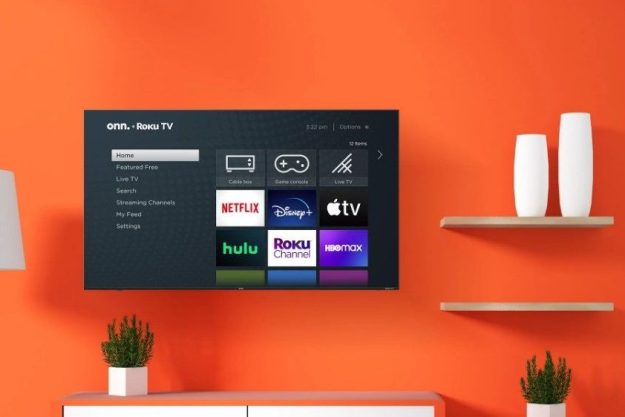
You know things are bad when relations are reduced to corporate tattletaling. But when it comes to pointing the finger at who’s responsible for its customers’ bad streaming video experience, Netflix is apparently willing to aim at its contentious partner, Verizon. Recently, we learned that Verizon internet customers suffering from buffering have begun seeing the message “ The Verizon network is crowded right now” complete with a scary exclamation point, courtesy of Netflix. A screenshot of the message was tweeted by Yuri Victor, and later confirmed via tweet by Netflix spokesman, Jonathan Friedland.
The tweets started a buzz online concerning Netflix’s brazen condemnation, growing loud enough to prompt a heated public spat between the two companies. The altercation resulted in a cease and desist order from Verizon on Thursday June 5th, and a blog post from Netflix four days later, ambiguously implying that the messages to Verizon customers would end on June 16th. But the debate appears far from over. Read below to follow the full timeline so far.
Verizon strikes back
Verizon’s quick-fire response to Netflix’s tatteltale messages started by denouncing them as a PR stunt. According to a report by Gizmodo, Verizon spokesperson Bob Elek posted this message in response: “This is a PR stunt. We’re investigating this claim but it seems misleading and could confuse people.” But that was just the start of the back and forth between the two adversaries.
The next day, Verizon raised the heat, ushering a cease and desist order from the company’s general counsel, Randall S. Milch, that in no small terms, ordered Netflix to stop displaying its messages.
“As Netflix knows, there are many different factors that can affect traffic on the Internet, including choices by Netflix in how to connect its customers and deliver content to them, interconnection between multiple networks, and consumer in-home issues such as in-home wiring, Wi-Fi, and devices settings and capabilities,” Milch wrote in the letter.
The statement concluded that if the messages continued, Verizon would “pursue legal remedies.”
Netflix concedes – sort of
Netflix at first shrugged off the threat. Representatives responded that same day with an official statement, telling several organizations, “This is about consumers not getting what they paid for from their broadband provider,” and telling The Verge, “We are trying to provide more transparency, just like we do with the ISP Speed Index, and Verizon is trying to shut down that discussion.”
On Monday, Netflix made good on its claims that the messages were little more than a test, however, implicitly agreeing to end the slams to Verizon on June 16th. Still, while the move seems to be aimed at satiating Verizon’s ready team of legal eagles, the company has seemingly no plans to back down completely.
“As part of this transparency campaign, we started a small scale test in early May that lets consumers know, while they’re watching Netflix, that their experience is degraded due to a lack of capacity into their broadband provider’s network,” the company said via the blog post.
After claiming the test was scheduled to conclude June 16th, the company also added, “We will evaluate rolling it out more broadly.” Not exactly a “kiss and make up” message.
Mo’ money, same problems
Buffering and poor picture quality aren’t new to many of Netflix’s customers, but a deal between the two companies in which Netflix reluctantly agreed to pay Verizon for a direct connection to its network was designed to rectify the problem. However, after Verizon’s FiOS service ranked a pitiful number 8 on last month’s Netflix Speed Index report, Monday’s blog also came with more bad news for the ISP. Though the messages may be stopping, Netflix was quick to point out Verizon’s FiOS slipped even further, now ranking at number 10 on Netflix’s Speed Index report for May. And Netflix wants you to know, as far as it’s concerned, the blame is all on the other side of the stream.
It’s no secret that Netflix is by far the most popular streaming service in the U.S. At peak hours, the service takes up a massive swath of bandwidth, most recently measured at around 34 percent of all traffic in North America. Its wide success, and perceived hogging of the network, put the company in prime position for ISPs like Comcast and Verizon to broker paid deals for more direct access to their large subscriber bases.
However, while Netflix’s much decried Comcast deal launched the communications titan to number 3 on the streaming chart, Verizon has had a lot of trouble keeping pace. And interestingly enough, the latest numbers show that Comcast slipped two spots in May as well, landing the company back at number 5.
The speed issue is even more entangled thanks to past claims that Verizon, and other ISPs, were intentionally throttling Netflix streams in order to coax cash from the service. However, if money was the motivation, and Verizon already has the deal it was looking for, the question as to why streams over Verizon’s pipelines are still so low must be asked. Perhaps the issue is less opaque than the throttling conspiracies suggest, and Verizon is simply unable to keep up with the Johnson’s when it comes to handling streaming video.
Then again, seeing Comcast move backwards last month as well, one has to wonder exactly where these infusions of cash from Netflix are actually going. Is the money going to the ISPs’ bottom line, instead of their pipelines? Or is the fix, as suggested by Verizon’s David Young in a recent Cnet interview, simply a work in progress?
In any case, while the conclusion of these tests next week may settle the legal issue, it appears that Netflix is no longer mincing words when it comes to exactly who it thinks is to blame for your sluggish feeds. There are plenty of bread crumbs leading to shady dealings between top ISPs and the rest of the Internet’s tangled pipelines, and Netflix has been quick to cast blame. He said/she said has become the status quo when it comes to the schoolyard fighting between Netflix and the ISPs with which it takes issue, becoming a near weekly phenomenon.
Netflix is now taking its case straight to the consumer, in a highly public forum. And with the whole world watching, it appears the cat may be out of the bag, messages or no.
Updated 6/05/2014: Today we learned that Verizon has expanded on its initial rebuff, with a cease and desist letter.
Update 6/09/2014: Netflix wrote in a blog that its “small scale test,” ostensibly referring to its messages to Verizon customers, would end June 16, 2014. The company also added new information from its latest speed index report.

